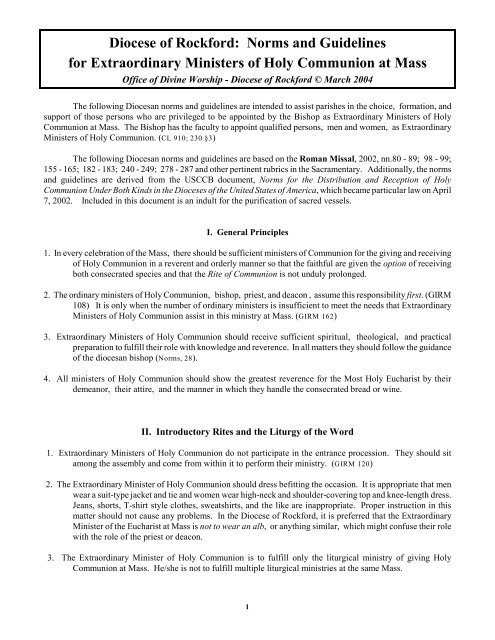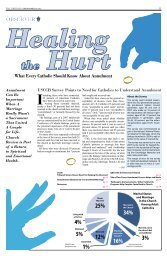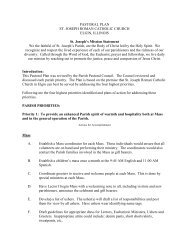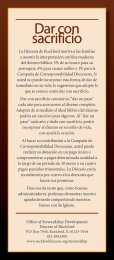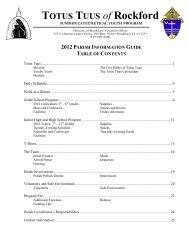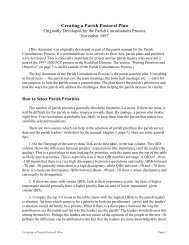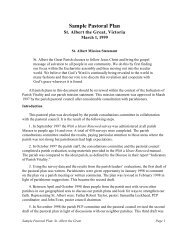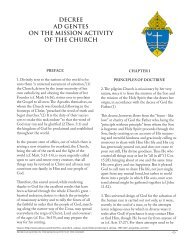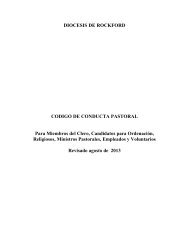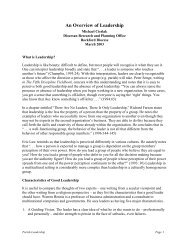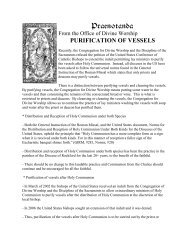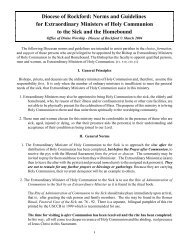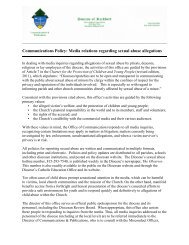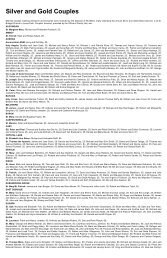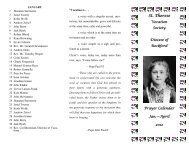Extraordinary Ministers of Holy Communion at Mass - Diocese of ...
Extraordinary Ministers of Holy Communion at Mass - Diocese of ...
Extraordinary Ministers of Holy Communion at Mass - Diocese of ...
Create successful ePaper yourself
Turn your PDF publications into a flip-book with our unique Google optimized e-Paper software.
<strong>Diocese</strong> <strong>of</strong> Rockford: Norms and Guidelines<br />
for <strong>Extraordinary</strong> <strong>Ministers</strong> <strong>of</strong> <strong>Holy</strong> <strong>Communion</strong> <strong>at</strong> <strong>Mass</strong><br />
Office <strong>of</strong> Divine Worship - <strong>Diocese</strong> <strong>of</strong> Rockford © March 2004<br />
The following Diocesan norms and guidelines are intended to assist parishes in the choice, form<strong>at</strong>ion, and<br />
support <strong>of</strong> those persons who are privileged to be appointed by the Bishop as <strong>Extraordinary</strong> <strong>Ministers</strong> <strong>of</strong> <strong>Holy</strong><br />
<strong>Communion</strong> <strong>at</strong> <strong>Mass</strong>. The Bishop has the faculty to appoint qualified persons, men and women, as <strong>Extraordinary</strong><br />
<strong>Ministers</strong> <strong>of</strong> <strong>Holy</strong> <strong>Communion</strong>. (CL 910; 230 §3)<br />
The following Diocesan norms and guidelines are based on the Roman Missal, 2002, nn.80 - 89; 98 - 99;<br />
155 - 165; 182 - 183; 240 - 249; 278 - 287 and other pertinent rubrics in the Sacramentary. Additionally, the norms<br />
and guidelines are derived from the USCCB document, Norms for the Distribution and Reception <strong>of</strong> <strong>Holy</strong><br />
<strong>Communion</strong> Under Both Kinds in the <strong>Diocese</strong>s <strong>of</strong> the United St<strong>at</strong>es <strong>of</strong> America, which became particular law on April<br />
7, 2002. Included in this document is an indult for the purific<strong>at</strong>ion <strong>of</strong> sacred vessels.<br />
I. General Principles<br />
1. In every celebr<strong>at</strong>ion <strong>of</strong> the <strong>Mass</strong>, there should be sufficient ministers <strong>of</strong> <strong>Communion</strong> for the giving and receiving<br />
<strong>of</strong> <strong>Holy</strong> <strong>Communion</strong> in a reverent and orderly manner so th<strong>at</strong> the faithful are given the option <strong>of</strong> receiving<br />
both consecr<strong>at</strong>ed species and th<strong>at</strong> the Rite <strong>of</strong> <strong>Communion</strong> is not unduly prolonged.<br />
2. The ordinary ministers <strong>of</strong> <strong>Holy</strong> <strong>Communion</strong>, bishop, priest, and deacon , assume this responsibility first. (GIRM<br />
108) It is only when the number <strong>of</strong> ordinary ministers is insufficient to meet the needs th<strong>at</strong> <strong>Extraordinary</strong><br />
<strong>Ministers</strong> <strong>of</strong> <strong>Holy</strong> <strong>Communion</strong> assist in this ministry <strong>at</strong> <strong>Mass</strong>. (GIRM 162)<br />
3. <strong>Extraordinary</strong> <strong>Ministers</strong> <strong>of</strong> <strong>Holy</strong> <strong>Communion</strong> should receive sufficient spiritual, theological, and practical<br />
prepar<strong>at</strong>ion to fulfill their role with knowledge and reverence. In all m<strong>at</strong>ters they should follow the guidance<br />
<strong>of</strong> the diocesan bishop (Norms, 28).<br />
4. All ministers <strong>of</strong> <strong>Holy</strong> <strong>Communion</strong> should show the gre<strong>at</strong>est reverence for the Most <strong>Holy</strong> Eucharist by their<br />
demeanor, their <strong>at</strong>tire, and the manner in which they handle the consecr<strong>at</strong>ed bread or wine.<br />
II. Introductory Rites and the Liturgy <strong>of</strong> the Word<br />
1. <strong>Extraordinary</strong> <strong>Ministers</strong> <strong>of</strong> <strong>Holy</strong> <strong>Communion</strong> do not particip<strong>at</strong>e in the entrance procession. They should sit<br />
among the assembly and come from within it to perform their ministry. (GIRM 120)<br />
2. The <strong>Extraordinary</strong> Minister <strong>of</strong> <strong>Holy</strong> <strong>Communion</strong> should dress befitting the occasion. It is appropri<strong>at</strong>e th<strong>at</strong> men<br />
wear a suit-type jacket and tie and women wear high-neck and shoulder-covering top and knee-length dress.<br />
Jeans, shorts, T-shirt style clothes, swe<strong>at</strong>shirts, and the like are inappropri<strong>at</strong>e. Proper instruction in this<br />
m<strong>at</strong>ter should not cause any problems. In the <strong>Diocese</strong> <strong>of</strong> Rockford, it is preferred th<strong>at</strong> the <strong>Extraordinary</strong><br />
Minister <strong>of</strong> the Eucharist <strong>at</strong> <strong>Mass</strong> is not to wear an alb, or anything similar, which might confuse their role<br />
with the role <strong>of</strong> the priest or deacon.<br />
3. The <strong>Extraordinary</strong> Minister <strong>of</strong> <strong>Holy</strong> <strong>Communion</strong> is to fulfill only the liturgical ministry <strong>of</strong> giving <strong>Holy</strong><br />
<strong>Communion</strong> <strong>at</strong> <strong>Mass</strong>. He/she is not to fulfill multiple liturgical ministries <strong>at</strong> the same <strong>Mass</strong>.<br />
1
II. Liturgy <strong>of</strong> the Eucharist<br />
4. The <strong>Extraordinary</strong> <strong>Ministers</strong> <strong>of</strong> <strong>Holy</strong> <strong>Communion</strong> are to approach the sanctuary (presbyterium) <strong>at</strong> the beginning<br />
<strong>of</strong> the Lamb <strong>of</strong> God in order to be ready to assist in the <strong>Communion</strong> Rite. Their assistance in this prepar<strong>at</strong>ion<br />
is secondary to the role <strong>of</strong> a Deacon, if present.<br />
5. As the Agnus Dei or Lamb <strong>of</strong> God is begun, the bishop or priest alone, or with the assistance <strong>of</strong> the deacon, and<br />
if necessary <strong>of</strong> concelebr<strong>at</strong>ing priests, breaks the Eucharistic bread.<br />
6. Other empty chalices and ciboria or p<strong>at</strong>ens are then brought to the altar if this is necessary [a design<strong>at</strong>ed<br />
<strong>Extraordinary</strong> Minister may help in this if there is no deacon or priest available]. Only the deacon or priest<br />
places the Eucharistic bread in several ciboria or p<strong>at</strong>ens and, if necessary, pours the Precious Blood into<br />
enough additional chalices as are required for the distribution <strong>of</strong> <strong>Holy</strong> <strong>Communion</strong>. If it is not possible to<br />
accomplish this distribution in a reasonable time, the celebrant may call upon the assistance <strong>of</strong> only deacons<br />
or concelebr<strong>at</strong>ing priests. This action is usually carried out <strong>at</strong> the altar, so th<strong>at</strong> the sharing <strong>of</strong> all from the<br />
one cup is signified. In the case <strong>of</strong> large assemblies, it may be done <strong>at</strong> the side table within the sanctuary<br />
(presbyterium). (Norms, 37).<br />
7. If <strong>Extraordinary</strong> <strong>Ministers</strong> <strong>of</strong> <strong>Holy</strong> <strong>Communion</strong> are required by pastoral need, they approach the altar as the<br />
priest receives <strong>Communion</strong>. After the priest has concluded his own <strong>Communion</strong>, he distributes <strong>Communion</strong><br />
to the <strong>Extraordinary</strong> <strong>Ministers</strong>, assisted by the deacon, [or, if a deacon is not present, by a design<strong>at</strong>ed<br />
<strong>Extraordinary</strong> Minister <strong>of</strong> <strong>Holy</strong> <strong>Communion</strong>] and then [the priest] hands the sacred vessels to each <strong>of</strong> them<br />
for distribution <strong>of</strong> <strong>Holy</strong> <strong>Communion</strong> to the people. (Norms, 38).<br />
8. All receive <strong>Holy</strong> <strong>Communion</strong> in the manner described by the General Instruction to the Roman Missal, whether<br />
priest concelebrants (cf. GIRM, nos. 159, 242, 243, 246), deacons (cf. GIRM, nos. 182, 244, 246), or<br />
<strong>Extraordinary</strong> <strong>Ministers</strong> <strong>of</strong> <strong>Holy</strong> <strong>Communion</strong> (cf. GIRM, no. 284). Neither deacons nor lay ministers may<br />
ever receive <strong>Holy</strong> <strong>Communion</strong> in the same manner <strong>of</strong> a concelebr<strong>at</strong>ing priest. The practice <strong>of</strong> <strong>Extraordinary</strong><br />
<strong>Ministers</strong> <strong>of</strong> <strong>Holy</strong> <strong>Communion</strong> waiting to receive <strong>Holy</strong> <strong>Communion</strong> until after the distribution <strong>of</strong> <strong>Holy</strong><br />
<strong>Communion</strong> is not in accord with liturgical law. (Norms, 39; GIRM, 160).<br />
9. After all <strong>Extraordinary</strong> <strong>Ministers</strong> <strong>of</strong> <strong>Holy</strong> <strong>Communion</strong> have received the Eucharist, the bishop or priest celebrant<br />
reverently hands vessels containing the Body or the Blood <strong>of</strong> the Lord to the deacons or extraordinary<br />
ministers who will assist with the distribution <strong>of</strong> <strong>Holy</strong> <strong>Communion</strong>. The deacon may assist the priest in<br />
handing the vessels containing the Body and Blood <strong>of</strong> the Lord to the <strong>Extraordinary</strong> <strong>Ministers</strong> <strong>of</strong> <strong>Holy</strong><br />
<strong>Communion</strong>. (Norms, 40).<br />
10. The various st<strong>at</strong>ions for the <strong>Extraordinary</strong> <strong>Ministers</strong> is determined according to the space <strong>of</strong> their particular<br />
church. Suffice it to say th<strong>at</strong>, if both species are given, there should be two ministers <strong>of</strong> the Precious Blood<br />
for each minister <strong>of</strong> the Host to help the <strong>Communion</strong> procession move smoothly, and without undue<br />
prolong<strong>at</strong>ion.<br />
11. The proper and only permissible form for distributing <strong>Holy</strong> <strong>Communion</strong> is to <strong>of</strong>fer the consecr<strong>at</strong>ed bread by<br />
saying, “The Body <strong>of</strong> Christ” and to <strong>of</strong>fer the consecr<strong>at</strong>ed wine by saying, “The Blood <strong>of</strong> Christ.” No other<br />
words or names should be added; and the formula should not be edited in any way. (Cf. GIRM, 161; 284-287).<br />
12. The communicant determines whether he or she will receive the Host in the hand or on the tongue. For<br />
those who choose to receive the Precious Blood, the cup is handed to the person after his or her response.<br />
When returned, the cup is wiped with the purific<strong>at</strong>or, and the cup turned slightly for the next communicant.<br />
2
13. The preferred method <strong>of</strong> giving <strong>Communion</strong> under both kinds is to give the Eucharistic bread first and the<br />
Eucharistic wine. If <strong>Communion</strong> is given by intinction, the communicant may never dip the Eucharistic<br />
bread into the chalice. <strong>Communion</strong> under either the form <strong>of</strong> bread or wine must always be given by a<br />
minister with the usual words. In all th<strong>at</strong> pertains to <strong>Communion</strong> under both kinds, the Norms for the<br />
Distribution and Reception <strong>of</strong> <strong>Holy</strong> <strong>Communion</strong> under Both Kinds in the <strong>Diocese</strong>s <strong>of</strong> the United St<strong>at</strong>es <strong>of</strong><br />
America are to be followed (see nos. 27-54, Norms).<br />
14. The faithful are not permitted to take up the Eucharistic bread or the sacred chalice themselves, and still less,<br />
hand them on to one another. The norm for reception <strong>of</strong> <strong>Holy</strong> <strong>Communion</strong> in the dioceses <strong>of</strong> the United<br />
St<strong>at</strong>es is standing. Communicants should not be denied <strong>Holy</strong> <strong>Communion</strong> because they kneel. R<strong>at</strong>her,<br />
the Pastor should address such instances pastorally by providing the faithful with proper c<strong>at</strong>echesis on<br />
the reasons for this norm.<br />
15. When receiving <strong>Holy</strong> <strong>Communion</strong> in the hand, the communicant bows his or her head before the sacrament as<br />
a gesture <strong>of</strong> reverence and receives the Body <strong>of</strong> the Lord from the minister. The consecr<strong>at</strong>ed host may be<br />
received either on the tongue or in the hand <strong>at</strong> the discretion <strong>of</strong> each communicant. When <strong>Holy</strong> <strong>Communion</strong><br />
is received under both kinds, the sign <strong>of</strong> reverence [bow <strong>of</strong> the head] is also made before receiving the<br />
Precious Blood.<br />
16. The blessing <strong>of</strong> children or infants should not be encouraged while distributing <strong>Communion</strong>. Children and<br />
infants are blessed with the full assembly <strong>at</strong> the end <strong>of</strong> <strong>Mass</strong>.<br />
17. If the Eucharistic bread or some particle <strong>of</strong> it falls, it should be picked up reverently by the minister. The<br />
consecr<strong>at</strong>ed bread may be consumed or completely dissolved in w<strong>at</strong>er before being poured down the<br />
sacrarium.<br />
18. Should there be any mishap--as when, for example, the consecr<strong>at</strong>ed wine is spilled from the chalice--then the<br />
affected “area . . . should be washed and the w<strong>at</strong>er poured into the sacrarium [GIRM, 280].”<br />
19. In those instances when there remains more consecr<strong>at</strong>ed wine than was necessary, if needs dict<strong>at</strong>e,<br />
<strong>Extraordinary</strong> <strong>Ministers</strong> <strong>of</strong> <strong>Holy</strong> <strong>Communion</strong> may consume wh<strong>at</strong> remains <strong>of</strong> the Precious Blood from their<br />
cup <strong>of</strong> distribution with due reverence <strong>at</strong> the altar. Sufficient instruction is to be given by the Pastor. When<br />
a sufficient number <strong>of</strong> priests or deacons is not available, <strong>Extraordinary</strong> <strong>Ministers</strong> <strong>of</strong> <strong>Holy</strong> <strong>Communion</strong> may<br />
purify the vessels. The amount <strong>of</strong> wine to be consecr<strong>at</strong>ed should be carefully measured before the<br />
celebr<strong>at</strong>ion so th<strong>at</strong> none remains afterward. It is strictly forbidden to pour the Precious Blood into the ground<br />
or into the sacrarium. (Norms, 51-55).<br />
20. Similarly, “consecr<strong>at</strong>ed hosts are to be reserved in a ciborium or vessel in sufficient quantity for the needs <strong>of</strong><br />
the faithful; they are to be frequently renewed and the old hosts properly consumed” (Code <strong>of</strong> Canon Law, no.<br />
939). Burying hosts or consecr<strong>at</strong>ed Eucharistic bread is strictly forbidden.<br />
IV. Concluding Rite<br />
21. <strong>Extraordinary</strong> <strong>Ministers</strong> <strong>of</strong> <strong>Holy</strong> <strong>Communion</strong> do not particip<strong>at</strong>e in the procession <strong>at</strong> the conclusion <strong>of</strong> the <strong>Mass</strong>.<br />
After they have exercised their ministry within <strong>Mass</strong>, they should return to their places in the assembly.<br />
3
V. Requirements for the Prepar<strong>at</strong>ion<br />
and Continuing Form<strong>at</strong>ion <strong>of</strong> <strong>Extraordinary</strong> <strong>Ministers</strong> <strong>of</strong> <strong>Holy</strong> <strong>Communion</strong><br />
The Pastor is to decide who should be chosen to be an <strong>Extraordinary</strong> Minister <strong>of</strong> <strong>Holy</strong> <strong>Communion</strong> for the parish,<br />
bearing in mind the following:<br />
1. Men and women, sixteen years and older, represent<strong>at</strong>ive <strong>of</strong> the parish community, may be chosen..<br />
2. Each person selected should be a practicing C<strong>at</strong>holic, in good standing, whose conduct <strong>of</strong> life does not contradict<br />
the teachings <strong>of</strong> the C<strong>at</strong>holic Church as described by the Magisterium, who is fully initi<strong>at</strong>ed through the<br />
Sacraments <strong>of</strong> Baptism, Confirm<strong>at</strong>ion, and Eucharist.<br />
3. Those persons selected for this ministry are to be given an appropri<strong>at</strong>e form<strong>at</strong>ion in the theology <strong>of</strong> the Eucharist<br />
based on the teaching in the C<strong>at</strong>echism <strong>of</strong> the C<strong>at</strong>holic Church, Article 3, The Sacrament <strong>of</strong> the Eucharist,<br />
numbers 1322-1419; The Real Presence <strong>of</strong> Jesus Christ in the Sacrament <strong>of</strong> the Eucharist (USCCB - 2001);<br />
and Norms for the Distribution and Reception Of <strong>Holy</strong> <strong>Communion</strong>, (USCCB, April 7, 2002)<br />
4. The instruction necessary for competency in this liturgical ministry should include:<br />
a. An adult understanding <strong>of</strong> the Eucharist in its historical, theological, liturgical, pastoral and spiritual<br />
dimensions;<br />
b. A knowledge about, and an understanding <strong>of</strong>, this particular liturgical ministry and its rel<strong>at</strong>ionship to<br />
other liturgical roles within the celebr<strong>at</strong>ion;<br />
c. Sufficient skills in the liturgical style <strong>of</strong> movement and reverence;<br />
d. There should be opportunities for form<strong>at</strong>ion in the spiritual growth <strong>of</strong> the <strong>Extraordinary</strong> Minster <strong>of</strong> the<br />
Eucharist; for sharing concerns; for reviewing and improving the ministry where necessary.<br />
VI. Procedure for Appointments as <strong>Extraordinary</strong> <strong>Ministers</strong> <strong>of</strong> <strong>Holy</strong> <strong>Communion</strong> <strong>at</strong> <strong>Mass</strong><br />
1. The Pastor <strong>of</strong> a parish is to submit to the Bishop, in writing, the names <strong>of</strong> those persons who qualify and<br />
have been chosen to be appointed as <strong>Extraordinary</strong> <strong>Ministers</strong> <strong>of</strong> <strong>Holy</strong> <strong>Communion</strong>.<br />
2. The appointment is made to a specific parish, and is exercised in th<strong>at</strong> parish only. If the minister moves<br />
to a different parish, the appointment ceases.<br />
3. The appointment as an <strong>Extraordinary</strong> Minister <strong>of</strong> <strong>Holy</strong> <strong>Communion</strong> is a privilege, not a right. Therefore,<br />
the appointment is made for a specific period <strong>of</strong> three years and may be termin<strong>at</strong>ed before the<br />
completion <strong>of</strong> the term.<br />
4. The Pastor has the option <strong>of</strong> re-submitting the names <strong>of</strong> the same persons for a second term <strong>of</strong> three years.<br />
At the end <strong>of</strong> this second term, an entirely new group <strong>of</strong> ministers is to be chosen. This change has the merit <strong>of</strong><br />
avoiding the presumption th<strong>at</strong> this ministry belongs by right to any individual, family or group. A specific period<br />
<strong>of</strong> time for the appointment has the additional value th<strong>at</strong> the minister is able to leave the ministry, if necessary, and/or<br />
for the Pastor if necessary, to request th<strong>at</strong> a particular minister leave the ministry.<br />
5. A letter <strong>of</strong> approval for the appointments will be issued from the Chancellor/Vice-Chancellor, <strong>of</strong> the<br />
<strong>Diocese</strong> along with certific<strong>at</strong>es <strong>of</strong> appointment and copies <strong>of</strong> these guidelines for each person so appointed.<br />
6. The <strong>Extraordinary</strong> <strong>Ministers</strong> <strong>of</strong> <strong>Holy</strong> <strong>Communion</strong> are to be commissioned to this ministry in the presence<br />
<strong>of</strong> the parish community <strong>at</strong> a Sunday <strong>Mass</strong>. The rite <strong>of</strong> commissioning to be used is found in the Book <strong>of</strong> Blessings,<br />
which is part <strong>of</strong> the Roman Ritual: Order <strong>of</strong> Commissioning <strong>Extraordinary</strong> <strong>Ministers</strong> <strong>of</strong> <strong>Holy</strong> <strong>Communion</strong> within<br />
<strong>Mass</strong>, nn.1871 to 1881. (pages 795-99 in the C<strong>at</strong>holic Book Company, 1989 version),<br />
4


